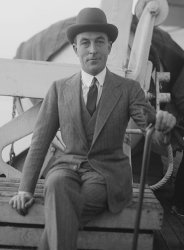News from Berlin
Institut Francais to Commemorate Life and Work of Jean Patou
October 07th, 2014
News from Berlin – On October 7th 2014, at 19:00, the Institut Francais will host a discussion about the life and work of French fashion designer and parfumeur Jean Patou.
Patou’s insistence on innovation in his work meant that he was the definition of a truly modern man. Harbouring an interest in fashion from an early age – due in part to his family’s tanning and fur business – Patou produced his first collection in 1914. Its potential success was, however, immediately interrupted by the advent of the First World War. On August 2nd 1914, a mere twenty four hours after the inauguration of the fashion house, its creator was called in for military service, serving in France for two years before being posted to Thessaloniki in Spring 1916. Although Patou’s artistic output was stifled during the war, his aesthetic sensibilities were profoundly influenced by the atrocities that he witnessed during his military service, and as such his later work was marked by ideas amassed during this period.
Upon his return, in the spring of 1919, Patou began to recognise the enormous burgeoning potential of couture fashion, both in France and in the United States. As a result, he visited America a number of times in the 1920s, constantly adding to his repertoire, which included sportswear, swimwear, and haute couture. He is even credited with inventing the cardigan! Thereafter, Patou also launched his perfume business, which remains relatively well-known today across the world. He is also credited with having created the first sun-tan lotion, which he named Huile de chaldée. Jean Patou died in 1936, at the age of 48.
It is curious to think that the somewhat forgotten fashion of Jean Patou should be revisited in Berlin in 2014, yet it coincides with the hundred year anniversary of the inception of the First World War. The fact that the Institut Francais should choose to commemorate his work in Berlin is testament to the greatly ameliorated relations between France and Germany in the modern era – it demonstrates the crucial role that cultural diplomacy plays in cross-cultural understanding which, in turn, reduces the likelihood of socio-cultural conflict. One hundred years on from the inception of the Great War, events like this must continue to be encouraged in order to avoid the kind of conflict that decimated our society a century ago.
News from Berlin - Berlin Global


